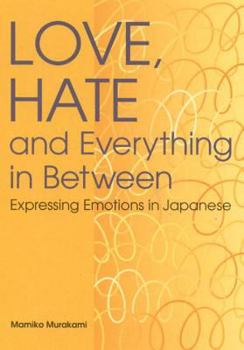Love, Hate and Everything in Between: Expressing Emotions in Japanese
(Part of the Power Japanese Series)
A desire to communicate heart-to-heart with people from another culture is what attracts many people to language study in the first place. But it can take a long time to make friends and feel socially comfortable in a Japanese-speaking context, and there are few textbooks that can help. This volume does just that, by collecting and discussing more than 400 phrases that are useful when talking about personal experience and nuances of feeling. With this book you can learn to say that you like someone, love someone, respect someone, have a thing for someone, have a crush on someone, still carry a torch for someone, have no feelings either way for someone, or wouldn't give someone the time of day. You can tease a friend about their new relationship, talk about children or parents, vent anger or express sympathy. You can learn many different ways to thank a person or to respond to a compliment, and the specific attitude that each conveys. All entries are defined and then amplified with two or three sample sentences. The naturalness of the sentences keeps the reading interesting, and makes it easier to gain not only passive understanding but the confidence to start using these phrases right away in conversation. Impress your boss, charm your neighbor, apologize to a co-worker. This handy guide will be welcomed by anyone hoping to make Japanese friends and influence Japanese people. Previous published in the Power Japanese series under the same title.
Format:Paperback
Language:English
ISBN:4770028032
ISBN13:9784770028037
Release Date:March 2002
Publisher:Kodansha
Length:1170 Pages
Weight:0.45 lbs.
Dimensions:0.5" x 7.1" x 5.1"
Customer Reviews
3 ratings
Great Use For Conversational Japanese
Published by Thriftbooks.com User , 17 years ago
I have many Japanese reference books, but I was looking for more of a book that can be used in conversational situations with my friends. I saw this book and then wanted to see if it held up to my needs. Sure enough, it did. Not only did it strengthen my knowledge of Japanese, it also really provides a nice conversational piece. I can't count how many times my Japanese friends have asked me, "Can I borrow that?" They enjoy using this book as well to see the equivalent translation/situation in English. I would recommend this book for intermediate or advanced learners of Japanese because it doesn't make much sense for a beginner due to difficult grammar and the meaning of the translations.
To the bride, the Sister-in-Law is a thousand demons
Published by Thriftbooks.com User , 20 years ago
Some people say that Japanese is not a very expressive language, with such subtle nuances and high context that blunt emotional vocabulary just doesn't exist. "Love, Hate and Everything In-between" will give you the necessary vocabulary to tell those people how wrong they are, and where they can stick it. Basically a dictionary of emotional vocabulary, this small book is organized into two large sections, "From Uncertainty to Love" and "From Uncertainty to Hate." In these two are smaller sub-categories, such as Flattery, Sympathy, Tough Love, Love to Excess, Higher Love from Buddha, Frosty Silence, Arrogance and Pride, Finding Fault, Getting Mad, Revenge, Betrayal and too many others to name. Each sub-category has several vocabulary words and phrases, as well as common usage for each entry. Like any Japanese study book worth getting, both romaji and kana are used for each entry. Anyone looking for a guide to picking up Japanese guys/girls might be disappointed with "Love, Hate and Everything In-between." This is a serious study aid for those looking to expand their fluency in Japanese, focusing on a specific, useful and fun aspect of the language. I have found it particularly of aid in reading Japanese manga, where relationships, both love and hate, form a major part of most storylines. The only drawback to this book is that it is pretty much a straight dictionary, without any exercises such as are found in the "Handbook of Japanese Verbs." It probably isn't something that you will read straight through, but rather pick an emotion and expand your ability to express emotions in Japanese.
This is a useful book
Published by Thriftbooks.com User , 24 years ago
This book isn't like a lot of books which fall under the category of picking up Japanese women. This book is about the words you use to talk about a relationship. Most other books just teach you some phrases, but this book teaches you a little bit more. It teaches you phrases based on different situations and feelings. You won't find anything in here about asking a girl for her phone number, but you will find good examples showing you how to express yourself in Japanese. The hate part of the book is probably more useful than the love part of the book. If a girl gets mad at you, you need to know what she is saying. This book does contain a lot of roma-ji, but it also contains a lot of hard Kanji. Usually I'd take off a star, because I really hate roma-ji, but this book deserves 5 stars.






